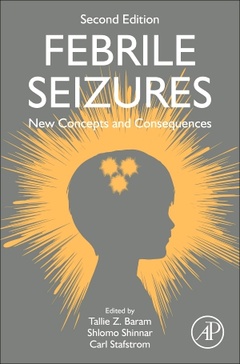Febrile Seizures (2nd Ed.) New Concepts and Consequences
Coordonnateurs : Baram Tallie Z., Shinnar Shlomo, Stafstrom Carl E.

Febrile seizures are the most common seizures in infants and children worldwide, This fact provides strong impetus to study and understand them and their consequences, and consider their treatment. These topics were the focus of the first edition of this book.
The 20 years since the publication of this first edition have witnessed an explosion of new information about febrile seizures, meriting this new edition. Key advances have been made in the genetics and neurobiological underpinnings of febrile seizures and especially the very long fever-related seizures called febrile status epilepticus. The role of neuroinflammatory factors in the emergence of these seizures and their consequences, the demonstration of unique clinical and neuroradiological aspects of febrile status epilepticus, and the prospect of predictive (bio)markers to identify and characterize cognitive and epilepsy outcomes are exciting and important. In this edition, the authors and editors tackle these developments in chapters addressing the questions of parents, physicians, allied health care professionals and basic and translational scientists.
1. Incidence and prevalence of febrile seizures 2. Who gets recurrent febrile seizures (also complex) 3. Outcomes of febrile seizures: cognitive and epileptogenesis: B. Genetic and Acquired Syndromes Associated with Febrile Seizures 4. The genetic landscape of febrile seizures and GEFS+ 5. SCN1A and Dravet syndrome 6. Other channel syndromes 7. FIRES and related syndromes C. Febrile Status Epilepticus 8. Epidemiology of FSE 9. Neuroimmune aspects of FSE 10. FSE and TLE 11. FSE and TLE- evolving therapeutic and surgical landscape 12. Cognitive outcome of FSE D. The Neurobiology of FS and FSE: experimental approaches 13. Why do febrile seizures involve the developing brain? 14. Cytokines in FS rat models 15. FS and FSE generation in rats and mice E. The Neurobiology of FSE-induced epilepsy and cognitive deficits: Experimental approaches 16. The pathogenesis of FSE-induced epilepsy: Neuroinflammation and Epigenetics 17. MicroRNAs and Epigenetic processes in FSE-provoked epilepsy 18. HCN channels in human and rodent Epileptogenesis induced by FSE 19. Cognitive problems following eFSE 20. Predicting TLE-like epilepsy – the role of MRI: F. Clinical and Translational Implications of FSE 21. MRI for assessing the impact of FSE and predicting outcomes 22. EEG for assessing the impact of FSE and predicting outcome G. Management of febrile seizures and FSE- past, present and futures 23. Evaluation and Practical Management approaches to simple and complex febrile seizures 24. What do we tell parents of a child with simple or complex febrile seizures? 25. The future of FS, FSE and their epileptogenic and cognitive outcomes
Dr. Shlomo Shinnar is a neurologist, pediatrician and epidemiologist at the Albert Einstein College of Medicine. His expertise focuses on comprehensive epilepsy management, child neurology and epilepsy with a focus on long term studies the prognosis of childhood seizures disorders. He is also an experienced clinical trialist and is the co-director of the Einstein NeuroNEXT cener of Excellence for Clinical Trials in Neurology.Dr. Shinnar conducts research on a variety of topics relating to childhood seizures, including when to initiate and discontinue antiepileptic drug therapy, prognosis following a first seizure, and prognosis following discontinuation of medications in children with seizures. He is also interested in the comorbidities of epilepsy and its impact on children and families. He current studies focus on status epilepticus, a life-threatening condition of persistent continu
- Reviews all aspects of febrile seizures, including epidemiology, neurobiology and treatment
- Discusses novel and newly discovered information based on up-to the minute methods
- Provides an engaging style that is accessible to clinicians, researchers and educated parents
Date de parution : 09-2022
Ouvrage de 368 p.
15.2x22.8 cm
Thème de Febrile Seizures :
Mots-clés :
Seizures; Epilepsy; genetics; status epilepticus; neuroepidemiology; neurobiology; animal models; electrophysiology; EEG



